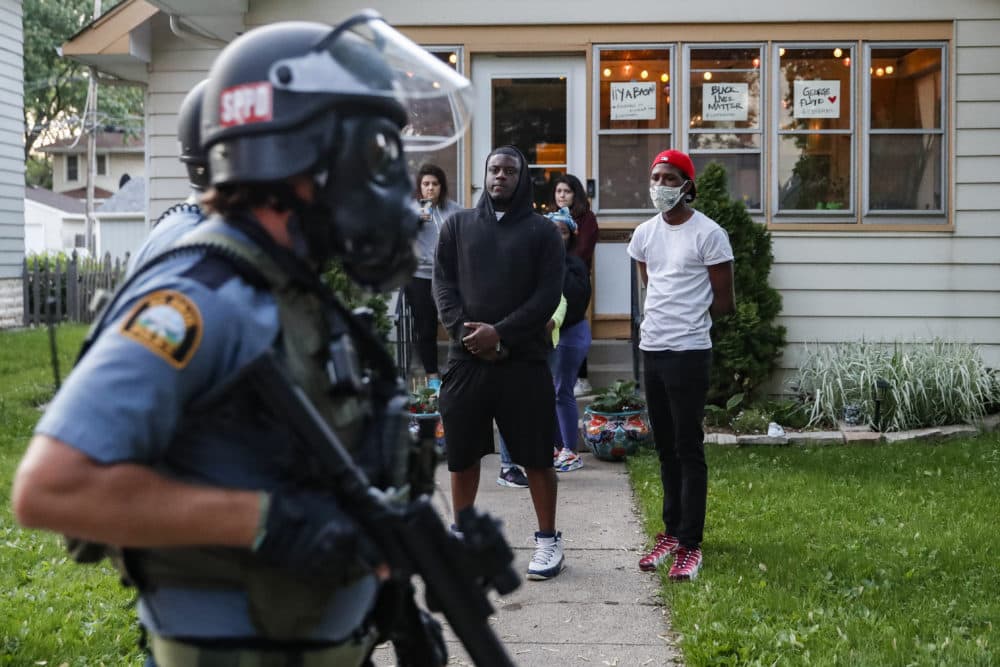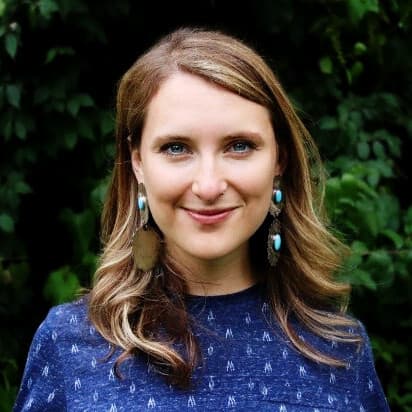Advertisement
On Point's Coronavirus Hours
Death Of George Floyd: A Long History Of Racism And Policing In America

Last week, a white woman called the police on a black birdwatcher in Central Park and police killed a black man in Minneapolis. We talk about how the two events are tied together by a history of racism and policing.
Guests
Stephen Henderson, host of "Detroit Today" on WDET since 2015. Pulitzer Prize-winning journalist who worked for the Detroit Free Press, the Baltimore Sun and the Chicago Tribune. (@SHDetroit)
Errin Haines, editor-at-large for The 19th, a nonprofit news organization reporting at the intersection of gender, politics and policy. (@emarvelous)
Katheryn Russell-Brown, professor and director of the Center for the Study of Race and Race Relations at the University of Florida Levin College of Law. Author of several books including "The Color of Crime,"and "Underground Codes: Race, Crime, and Related Fires." (@KRussellBrown)
Interview Highlights
Errin Haines: "When I woke up this morning, one of the things that was on my mind — and something that's been on my mind for about the past month — is the idea that we are experiencing the pandemic within a pandemic. The dual ills of coronavirus and systemic racism, both of which must be confronted with a new normal that really says what we've been saying in coronavirus. Right? 'We're all in this together.' It remains to be seen whether that's going to be true as the country is confronted with the systemic racism, yet another inequality in America that has been exposed in the midst of this coronavirus crisis.
"And so, what I woke up thinking this morning was, 'What if we covered the virus of systemic racism the way we covered COVID-19? Like some of the things that we might be asking, 'How do people get sick? What are the symptoms? Is there a cure? What is the cure? How long will it take? How much will it cost? How do we get back here to the most people? Who is the most affected by it and why? How do we keep people safe? And what can we all do as citizens and neighbors to minimize harm? And what is the federal government's response to this? What is the response of our governors, our mayors? What is their responsibility?'
"And so these were some of the things that were on my mind. I'm in Philadelphia, which many Americans regard as the cradle of our democracy, where the Constitution was written. And that really makes me think a lot about what it means to be a citizen in this moment. As you mentioned, this is a moment that is not just about last week. It's not just about this year. It's not just about the past decade.
Advertisement
"I mean, this has been generations in the making. And the moment in which we now find ourselves is merely the latest accelerant to those things. You know, I started my career writing about the vestiges of racism and the legacy of the civil rights movement. Now, again, my focus is on the retrenchment and the retreat of the gains of racial progress that we have made as a nation. And so that is just deeply troubling for me as an American. But frustrating, disappointing and painful for me as a black person in America."
Stephen Henderson: "I think that's a wonderful analogy. And if I could, I would sort of borrow and alter it just a bit. I think systemic racism is very much like a virus. And very much like the COVID-19 virus in that it is spread very easily and very damaging. But I actually think that the way we respond to it in many ways in this country is more similar or more analogous to the way we deal with the common cold, which is also a virus that we just kind of accept that we have to live with. People assume that they will get sick and that they will maybe get better. And they don't respond with the urgency that we have to the coronavirus. So the shift is thinking of this as something that's virulent and dangerous and deadly as opposed to something that's tolerable."
From The Reading List
The Nation: "People Can Only Bear So Much Injustice Before Lashing Out" -- "I would never throw a rock at the police. I would never throw a brick through the window of a big-box store. I would never set fire to an office building. But I want to. I understand why some people do."
Los Angeles Times: "Op-Ed: Kareem Abdul-Jabbar: Don’t understand the protests? What you’re seeing is people pushed to the edge" — "What was your first reaction when you saw the video of the white cop kneeling on George Floyd’s neck while Floyd croaked, 'I can’t breathe'?"
Los Angeles Times: "George Floyd, Central Park and the familiar terror they inspire" -- "I didn’t feel well Tuesday. My body was tense, my stomach unsettled, the headache I was trying to push past kept pushing back. On most days I choose to be numb. Tuesday, I decided to feel. I recognize for some the video of George Floyd’s fatal encounter with four Minneapolis police officers is shocking. For me, it was not. I may not always choose to feel, but I am always aware. I learned early on that I didn’t have the luxury of not being aware."
Washington Post: "How Amy Cooper and George Floyd represent two versions of racism that black Americans face every day" — "How refreshing it would have been if Amy Cooper had said, 'Yep, that was a pretty clear act of racism on my part,' instead of apologizing to 'that man' and insisting that she was not really a racist. She might not be, but her actions surely were."
ProPublica: "Yes, Black America Fears The Police. Here's Why." -- "Last July 4, my family and I went to Long Island to celebrate the holiday with a friend and her family. After eating some barbecue, a group of us decided to take a walk along the ocean. The mood on the beach that day was festive. Music from a nearby party pulsed through the haze of sizzling meat. Lovers strolled hand in hand. Giggling children chased each other along the boardwalk."
Arizona Daily Sun: "George Floyd death is why Amy Cooper's call is repugnant" — "In case it’s not perfectly clear why it’s reckless and repugnant for a white woman to call the police on an African American man who reminded her to leash her dog in Central Park, George Floyd is the reason. Floyd died Monday after bystander video showed a Minneapolis police officer kneeling on his neck as Floyd — handcuffed — pleads, 'Please, please, please, I can’t breathe. Please, man,' before falling unconscious. He died at the hospital a few hours later."
CNN: "This is not the America I want to pass down to my children" -- "On February 8, 1968, three South Carolina State University students were killed by State Highway Patrol Troopers during a campus protest. Twenty-seven others were wounded. My father, Cleveland Sellers, Jr., was shot in the arm that day, convicted for inciting a riot, and served seven months in prison. This dark day is known by many, but not enough, as the Orangeburg Massacre. And though it took place 16 years before I was born, it remains the most important day in my life."
The Marshall Project: "Before George Floyd’s Death, Minneapolis Police Failed to Adopt Reforms, Remove Bad Officers" — "As video footage of George Floyd’s last moments circulated this week, many watched in shock and revulsion. The 46-year old black man died Monday, pleading for air, as a Minneapolis police officer knelt on his neck during an arrest.But few could share the horrible familiarity the clip would evince for Valerie Castile, who four years ago watched similar footage: her son, Philando, dying after a police officer shot him during a traffic stop in a Minneapolis suburb. Her son’s killing added fuel to the national conversation about how police use force against people of color, and prompted promises from civic leaders across Minnesota to reform policing."
This program aired on June 1, 2020.

